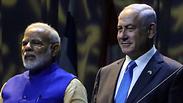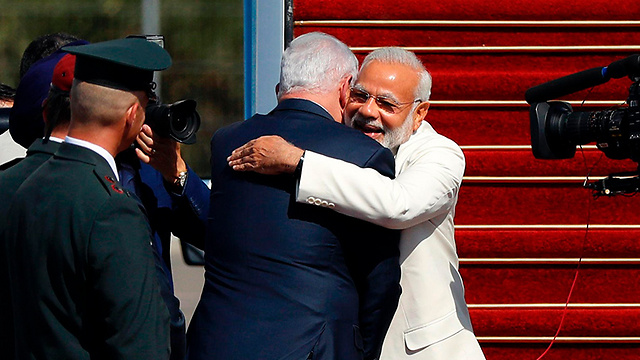
Israel-India relations were born in Oslo
Op-ed: The Indian prime minister’s visit to Israel doesn’t prove that there is no diplomatic isolation. Rather, it points to the huge potential in reaching an agreement with the Palestinians, or at least in trying to advance negotiations.
During the welcoming ceremony and reception at Ben-Gurion Airport, Netanyahu told the leader of the world’s biggest democracy: “We waited 70 years for this.” He’s right. But he didn’t bother explaining why Israel and India established full diplomatic relations only 25 years ago. Even if Prime Minister Netanyahu prefers to ignore the answer, Foreign Minister Netanyahu is well aware of it: The Israel-India axis wasn’t really born in Jerusalem or in New Delhi—it was born in Oslo.
Ironically, or even absurdly, Netanyahu is waving this historical visit as proof that his foreign policy, which supports a diplomatic stalemate with the Palestinians, is bearing fruit. He is forgetting and trying to make us forget, however, that the purpose of this visit is to mark the 25th anniversary of a relationship which was established in spite of—and not thanks to—this policy. Because despite all the failures and disappointments created by the Oslo Agreements, the talks which began between Israel and the PLO (and later the Palestinian Authority) in the early 1990s drove the changes in the international system that allowed India to free itself from the bloc of non-aligned countries—and particularly from the influence of the Muslim states that controlled that bloc—and to move closer to Israel and establish formal relations with the country in 1992.

There is no doubt that the two countries have gotten closer in recent years. This building relationship is both the result of the rise to power of the Bharatiya Janata Party (BJP), led by Modi, which—being a Hindu nationalist party—doesn’t rely as much on the Muslim minority’s support, and the chemistry between Netanyahu and Modi. In international relations, however, there is no room for friends—there is only room for interests. If and when India is forced to choose between Israel and the Arab states—during a conflict with the Palestinians, for example—all the hugs in the world won’t really help us.
The map of interests in the region explains why: India has two strategic anchors in the Middle East which are crucial for its survival. The first is oil. More than half of its energy sources are imported from the region. And while its industry is only developing, so is its dependency on the Arab states and on Iran.
Second, about six million Indian work migrants are earning a living in the Middle East, mostly in Saudi Arabia and in the Gulf emirates. The annual sum they send back to India exceeds $30 billion—seven times the volumes of India’s commerce with Israel—and is a significant part of its foreign-exchange reserves. These are needs that Israel is incapable of providing and losses that it won’t be able to cover.
So we mustn’t delude ourselves. The Indian prime minister’s visit to Israel doesn’t prove that there is no diplomatic isolation, but quite the opposite: It points to the huge potential in reaching an agreement with the Palestinians, or at least in trying to advance negotiations. Israel and India have shared international interests, as the prime minister said, but solving the Palestinian issue and ending the occupation were and remain the key for the fulfillment of these interests. Just like the recent UNESCO vote illustrates, the Palestinian problem won’t go away. Hugging Modi and being inspired by his enthusiasm for yoga won’t get Israel out of it.
Dr. Yoav Fromer teaches politics and history at Tel Aviv University.










